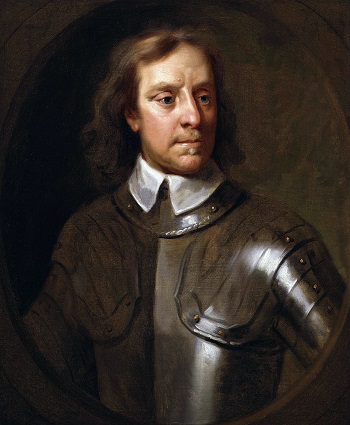From the moment of Monk’s entry the restoration of the Stuarts became inevitable.
Continuing Of Cromwell’s Rule In England and the Restoration
with a selection from On Heroes, Hero-Worship, and The Heroic in History by Thomas Carlyle published in 1841. The selections are presented in a series of ten easy 5 minute installments.
Previously in Of Cromwell’s Rule In England and the Restoration.
Time: 1649-1660
Place: Great Britain

Public domain image from Wikipedia.
Still steadily advancing, but lavishing protestations of loyalty to the Rump, while he accepted petitions for a “Free Parliament,” Monk on February 3d entered London unopposed. From the moment of his entry the restoration of the Stuarts became inevitable. The army, resolute as it still remained for the maintenance of “the cause,” was deceived by Monk’s declarations of loyalty to it, and rendered powerless by his adroit dispersion of the troops over the country. At the instigation of Ashley Cooper, those who remained of the members who had been excluded from the House of Commons in 1648 again forced their way into Parliament, and at once resolved on a dissolution and the election of a new House of Commons.
The dissolution in March was followed by a last struggle of the army for its old supremacy. Lambert escaped from the Tower and called his fellow — soldiers to arms; but he was hotly pursued, overtaken, and routed near Daventry; and on April 25th the new House, which bears the name of the “Convention,” assembled at Westminster. It had hardly taken the solemn “league and covenant” which showed its Presbyterian temper, and its leaders had only begun to draw up terms on which the King’s restoration might be assented to, when they found that Monk was in negotiation with the exiled court.
All exaction of terms was now impossible; a declaration from Breda, in which Charles promised a general pardon, religious toleration, and satisfaction to the army, was received with a burst of national enthusiasm; and the old constitution was restored by a solemn vote of the convention, “that according to the ancient and fundamental laws of this kingdom, the government is, and ought to be, by King, Lords, and Commons.” The King was at once invited to hasten to his realm; and on May 25th Charles landed at Dover, and made his way amid the shouts of a great multitude to Whitehall. “It is my own fault,” laughed the new King with characteristic irony, “that I had not come back sooner; for I find nobody who does not tell me he has always longed for my return.”
In his progress to the capital Charles passed in review the soldiers assembled on Blackheath. Betrayed by their general, abandoned by their leaders, surrounded as they were by a nation in arms, the gloomy silence of their ranks awed even the careless King with a sense of danger. But none of the victories of the “new model” were so glorious as the victory which it won over itself. Quietly and without a struggle, as men who bowed to the inscrutable will of God, the farmers and traders who had dashed Rupert’s chivalry to pieces on Naseby field, who had scattered at Worcester the “army of the aliens,” and driven into helpless flight the sovereign that now came “to enjoy his own again,” who had renewed beyond sea the glories of Cressy and Agincourt, had mastered the Parliament, had brought a king to justice and the block, had given laws to England, and held even Cromwell in awe, became farmers and traders again, and were known among their fellow — men by no other sign than their greater soberness and industry.
And, with them, Puritanism laid down the sword. It ceased from the long attempt to build up a kingdom of God by force and violence, and fell back on its truer work of building up a kingdom of righteousness in the hearts and consciences of men. It was from the moment of its seeming fall that its real victory began. As soon as the wild orgy of the Restoration was over, men began to see that nothing that was really worthy in the work of Puritanism had been undone. The revels of Whitehall, the scepticism and debauchery of courtiers, the corruption of statesmen, left the mass of Englishmen what Puritanism had made them — serious, earnest, sober in life and conduct, firm in their love of Protestantism and of freedom. In the Revolution of 1688 Puritanism did the work of civil liberty which it had failed to do in that of 1642. It wrought out, through Wesley and the revival of the eighteenth century, the work of religious reform which its earlier efforts had only thrown back for a hundred years. Slowly but steadily it introduced its own seriousness and purity into English society, English literature, English politics. The history of English progress since the Restoration, on its moral and spiritual sides, has been the history of Puritanism.
| <—Previous | Master List | Next—> |
Thomas Carlyle begins here. John R. Green begins here. Samuel Pepys begins here.
More information here and here, and below.
We want to take this site to the next level but we need money to do that. Please contribute directly by signing up at https://www.patreon.com/history

Leave a Reply
You must be logged in to post a comment.